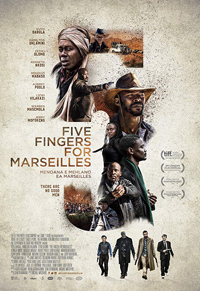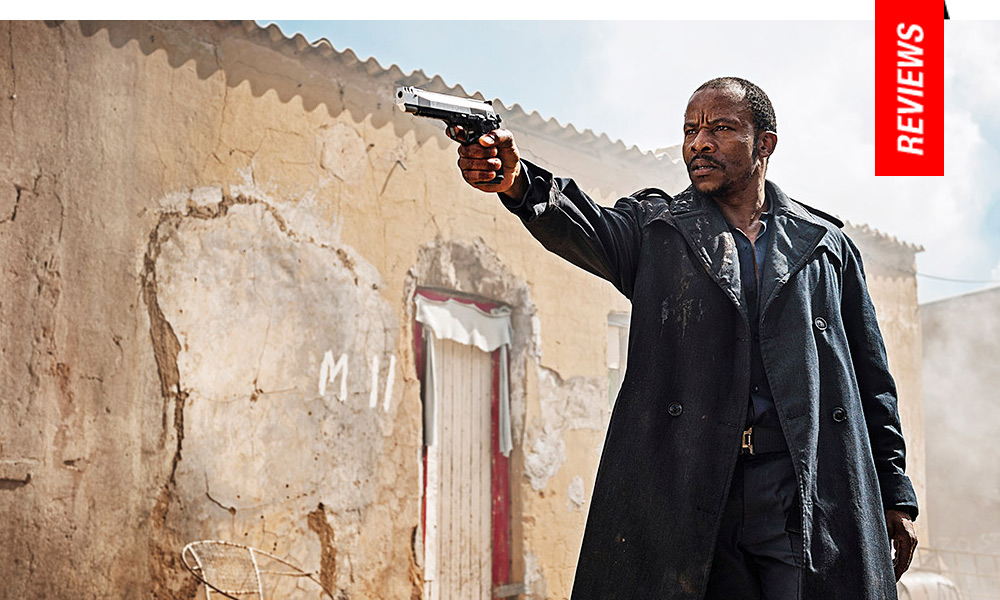Five Fingers for Marseilles | Review
Finger Food: Matthews Attempts to Mount a Western in Modern Colonialist Trauma
 Kudos to director Michael Matthews and screenwriter Sean Drummond for taking the time to develop the perspective of an indigenous South African population driving the story of their attempted genre thriller in debut Five Fingers for Marseilles. But while pains were obviously taken to keep the development of their central characterizations intact, this Western infused melodrama hemorrhages the tension it so feverishly attempts to distill in the groundwork of its first act.
Kudos to director Michael Matthews and screenwriter Sean Drummond for taking the time to develop the perspective of an indigenous South African population driving the story of their attempted genre thriller in debut Five Fingers for Marseilles. But while pains were obviously taken to keep the development of their central characterizations intact, this Western infused melodrama hemorrhages the tension it so feverishly attempts to distill in the groundwork of its first act.
As a narrator explains the development of a region thanks to a railway system, the displacement of the natives to a hilly terrain renamed Railway finds the inhabitants dependent upon the transportation system for economic well-being. As systems collapse and erode between the local urban centers, each named for famous international cities such as Paris, Rome, Barcelona, and Marseille, the dwellers of Railway begin to find themselves vulnerable to hostile takeover by local crime syndicates.
Living near the colonial town called Marseille on South Africa’s Eastern Cape, five friends dub themselves the Five Fingers as they cavort in more-or-less innocent, childhood fashion. But when two white South African policemen visit their home in the hill town called Railway, the antagonizers find themselves pummelled with eggs and sling-shots. Arresting Lerato, who is the girlfriend of Finger leader Tau (coined the Lion of Marseille), results in a violent altercation and murder. Serving a prison sentence, Tau (Vuyo Dabula) returns to his childhood home two decades later to find everything in ill-repair. Hounded by local gangs, who have taken over Railway in an exchange for deals with the mayor of Marseille, Bongani (Kenneth Nkosi), who was also once one of the Five, the populace is in need of an outspoken hero like Tau to right these wrongs.
As the Five Fingers are introduced as a gang of ragtag children, it would appear Matthews is yearning for a sort of The Magnificent Seven kind of vibe (the 1960 title which was John Sturges’ Americanized version of Kurosawa’s Seven Samurai), perhaps with a hint of Stand by Me (1986) considering its child protagonists. In easy-to-digest but lackluster fashion, each of the Fingers are introduced during a monologue in which one of the children professes to tell their story by relating each of their characteristics, which dictates all their nicknames, all of which follows a rather tense standoff between one another with their slingshots, an image used to bolster the film’s climax, which would have been a lot more welcome had it arrived about half an hour earlier.
Building from scenarios used from the wizened tactics of many a famed Western, including everything from the classic High Noon (1952) to Joseph H. Lewis’ Terror in a Texas Town (1958), Five Fingers for Marseille is all about a prodigal hero returning to liberate his childhood home from the dastardly villains who have run it into the ground. But while screenwriter Drummond may be engaged with the novelistic approach of showcasing the perspective of the oppressed, any attempt to craft an efficient thriller gets lost within the robes of a westernized melodrama. Handfuls of scenes repeat similar beats, including reunions and various face-offs with the local head villain, a milky eyed madman who tells Tau, “My mother was struck by lightning the day I was born.”
While Matthews certainly conjures all the requisite elements, particularly with DP Shaun Harley Lee’s rendering of a spooky, nighttime rural wasteland, its energies are consumed by lackluster and sometimes downright tepid swaths of dialogue. The reunification of the Five Fingers (including relatives and new members of disenfranchised folks, including a Chinese shop owner) doesn’t seem to add any real significance to the lofty, legendary inspired set-up.
While South African cinema begins to take more of an international hold, thanks to the likes of Oliver Hermanus and John Trengove’s recent festival hit The Wound, genre items remain an elusive happening. Matthews clearly has a lot of love for the elements inspiring Five Fingers for Marseilles, but it ultimately falls apart during the exact moments it should be most compelling.
Reviewed on September 7th at the 2017 Toronto International Film Festival – Discovery Programme. 120 Mins.
★★/☆☆☆☆☆
Los Angeles based Nicholas Bell is IONCINEMA.com's Chief Film Critic and covers film festivals such as Sundance, Berlin, Cannes and TIFF. He is part of the critic groups on Rotten Tomatoes, The Los Angeles Film Critics Association (LAFCA), the Online Film Critics Society (OFCS) and GALECA. His top 3 for 2021: France (Bruno Dumont), Passing (Rebecca Hall) and Nightmare Alley (Guillermo Del Toro). He was a jury member at the 2019 Cleveland International Film Festival.

























